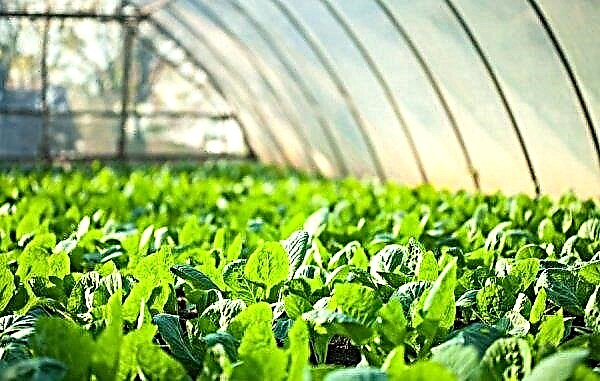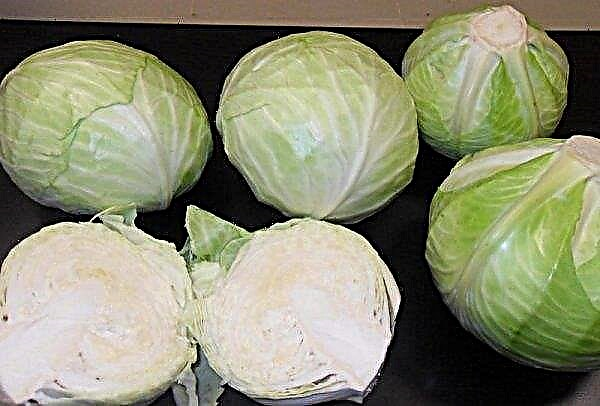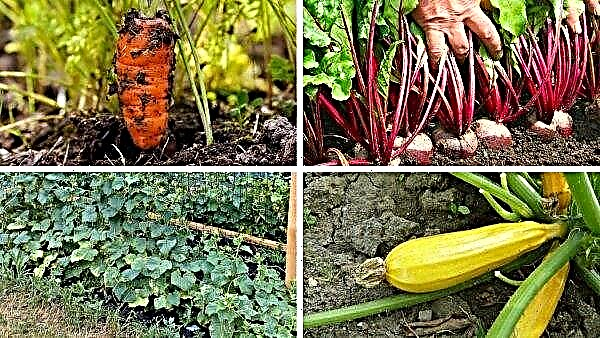Eggplant is one of the most valuable vegetable crops due to its rich set of vitamins, trace elements and easily digestible fiber. However, these vegetables have the property to be bitter, and this can lead to the fact that they are simply removed from the diet. Further in the article - useful information on how to minimize or even remove the bitter taste from eggplant.
Did you know? Eggplant belongs to a small group of vegetable crops (such as asparagus, potatoes, spinach or Brussels sprouts) that are not eaten raw. This is due to the fact that the beneficial properties of these products are revealed precisely during cooking. In addition, in raw form, they are more difficult to digest and absorb by the body.
Why eggplant is bitter: the main reasons
Eggplant fruits have an “unpleasant” feature to accumulate poisonous glycoside - solanine, which causes the appearance of bitterness in the fruits even at the growing stage. It mainly accumulates in the peel. Consider the main causes of bitterness in these vegetables, as well as how this can be avoided with the help of proper agricultural technology.
Late cleaning
The reason for the appearance of a bitter taste in the "blue" may be a violation of the harvest. The ripeness of these vegetables occurs approximately 40 days after the fruit has been set. Overripe fruits are thick-skinned, when pressed, there is no elasticity, the color of the fruits is dirty dark, uncharacteristic for a particular variety of vegetable.
Sudden change in weather
Bitterness can add frequent sharp fluctuations in temperature during ripening. If vegetables are cultivated in the open ground and it is not possible to regularly cover the plants with protective material (plastic wrap, spanbond), then the bitter taste can be eliminated only during subsequent cooking.
Did you know? In studies on water purification from oil pollution carried out in Turkey, it was found that eggplant flour is the best of all known absorbents for the elimination of oil films
Wrong watering mode
Insufficient watering or an excess of moisture in the soil also leads to the accumulation of bitterness in eggplant. Regular watering of plants with water at room temperature (cold water from a well or from a well is excluded) is necessary for the proper formation of fruits.
Wrong variety
There are varieties that initially have a characteristic bitterness. As a rule, about the taste characteristics of a particular variety can be read on the packaging with seeds. In this case, bitterness can be eliminated immediately before cooking. However, sometimes you have to face the fact that cooking does not give the guaranteed taste of the cooked vegetable dish - for example, baked eggplant turns out to be bitter. In this case, it is possible to “save” the dish by removing the peel from the cooked vegetables, since bitterness, as a rule, is concentrated in it.
However, sometimes you have to face the fact that cooking does not give the guaranteed taste of the cooked vegetable dish - for example, baked eggplant turns out to be bitter. In this case, it is possible to “save” the dish by removing the peel from the cooked vegetables, since bitterness, as a rule, is concentrated in it.
What to do to avoid eggplant bitter?
A small amount of solanine, causing an unpleasant feeling of bitterness in the mouth, is quite simple to remove from young vegetables. The following are proven ways to eliminate bitterness in the “blue ones”.
Did you know? Eggplant contains a lot of vitamin PP (nicotinic acid). Therefore, it is recommended to regularly use data vegetables people who quit smoking.
Freezing
Freezing is not the most common method of dealing with bitterness, but effective. To do this, it is recommended to remove chopped (maybe whole) vegetables for 4-5 hours in the freezer. After freezing, squeeze out the released water.
Seed cutting
A more laborious way to get rid of a bitter taste is to remove the seeds. To do this, you need to cut the vegetable along and carefully select the seeds with a spoon. At the same time, there is a great advantage over other methods: the eggplant is not soaked additionally with water.
Cleaning
As mentioned above, the peel of eggplant is the main "store" of bitterness. Therefore, if the culinary recipe allows the use of exclusively pulp, the fruit just needs to be peeled and then cook the desired dish.
Soaking
Soak the eggplant is recommended in cold salt water (1 tbsp. L salt per 1 liter of water). Sliced vegetables must be lowered into brine, squeezed on top with a plate or cutting board and put the load. After 40 minutes, the vegetables should be washed with salt in running water and put on paper towels to glass the water. When soaking, it is also recommended to use milk. To do this, slightly salted eggplant slices should be covered with a thin cloth and sprinkled with milk on top, and then placed under oppression for 10 minutes. After the specified time, vegetables can be used for cooking.
When soaking, it is also recommended to use milk. To do this, slightly salted eggplant slices should be covered with a thin cloth and sprinkled with milk on top, and then placed under oppression for 10 minutes. After the specified time, vegetables can be used for cooking.
Salt application
Sliced vegetables should be placed in a container and sprinkled with salt. Depending on the number of slices, the exposure time will be different, but not more than 30 minutes. Next, you need to rinse the vegetables in plenty of water and leave to drain in a colander.
Important! For this method of removing bitter taste from eggplant coarse salt is recommended. In this case, the vegetables will not come out salted.
How to prevent the appearance of bitterness when growing?
You can avoid the presence of bitterness in the harvested crop if you follow all the rules of agricultural technology for growing eggplant seedlings.
In addition, you can increase the resistance of the plant through the use of paired vaccination:
- Seeds intended for growing seedlings must be zoned, that is, they must be suitable for the soil and climatic characteristics of places of future growth.
- In properly prepared containers (washed and disinfected) with fertile soil, you need to plant the seeds, previously soaked in a weak solution of potassium permanganate. Depth - about 2 cm, the distance between the seeds - about 3 cm.
- Cover the box with plastic wrap. The temperature inside the greenhouse should be around + 28 ° C.
- After emergence of shoots to remove a film.
- When 3 leaves appear on the shoots, each plant is placed in separate pots.
- When the seedlings reach 15 cm, in 2 seedlings on the stems you need to make an incision 2 cm long and at the same level.
- Connect the stems “notch to notch” and leave for 7 days, after wrapping the “pair” with film.
- Then cut the weaker seedling above the graft zone and leave for another week.
- The result is 1 plant with 2 root systems, which can be planted in open ground or a greenhouse.

Varieties of eggplant without bitterness
At present, it has become possible to grow eggplants not only in regions with a warm, stable climate, but also in the so-called “risky farming zones”. Modern selection allows you to get a consistently high yield of "little blue" both in greenhouses and in open ground.
It is worth paying attention to varieties and hybrids, which, if grown properly, will please an excellent crop:
So, eggplant is a valuable and tasty vegetable crop, which in some cases can “upset”. But you should not reduce consumption or completely abandon this vegetable due to the presence of bitterness. If you follow the simple techniques of agricultural technology and cooking, the eggplant will successfully take its rightful place in the diet.












